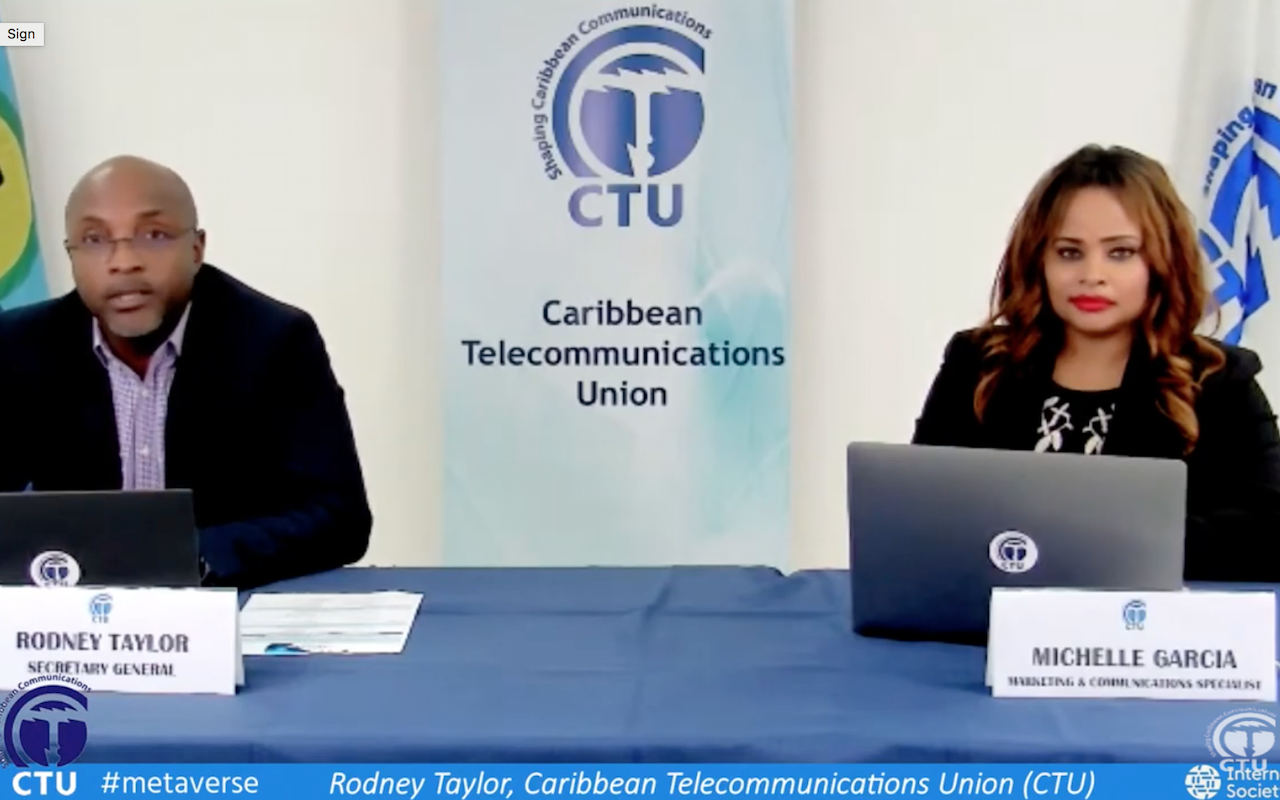Barbadians and Caribbean citizens must not be left behind as the new and emerging digital space which offers wealth-generating opportunities, the Metaverse, develops, say regional officials.
At a region-wide seminar hosted by the Barbados Government and the Caribbean Telecommunications Union (CTU) on Tuesday, Secretary-General of the CTU Rodney Taylor told the almost 1,000 participants the Caribbean must not be content to be merely consumers of fast-growing technology products but must become key owners.
“One thing we must never do in the region is to relinquish all technological innovation to the developed countries and simply be consumers of technology products and services residing in a distant cloud. We have too much regional talent for that to be the case,” he said. “Yes, we must build global relationships and collaborate but we must also take ownership for and be craftsmen and women of our destiny.”
This significant opportunity for Caribbean content creators was echoed by major players already operating in the digital space, including developers such as co-founder and CEO of SuperWorld Hrish Lotlikan, and Sebastien Borget, the co-founder of SandBox.
SandBox is a virtual space where players build, own and monetise their gaming experiences using tradable non-fungible tokens (NFTs). SuperWorld is a metaverse where users buy, sell and curate virtual real estate mapped from the physical surface of the Earth.
Lotlikan and Borget described the metaverse as essentially a network of 3D interfaces that enables individual connection and access to a parallel digital universe through an avatar, potentially enhancing the work, play, and education of the individual. Because participants are owners of the content they create, there are wealth generation possibilities.
Both speakers emphasised that anyone can get involved in either metaverse spaces for free.
However, Chairman of the CARICOM Commission on the Economy Professor Avinash Persaud who also addressed the webinar, made a strong case for new structures to ensure that technology benefits all and not a select few.
He cautioned that technology on its own does not improve the condition of humanity.
Professor Persaud added that while technology is important for economic growth, data collected since the 1950s show that technology and technological change contributes just one to two per cent growth per year.
Instead, he said, that technology and the computer revolution “have been associated with increasing inequality, changing levels of wealth from one sector to another, and a concentration of wealth” in the hands of a few.
He went further to suggest that while there has been the creation of Internet billionaires, “there has been no concomitant lifting of others out of poverty.”
“Society must therefore think about how it structures these initiatives for the benefit of all,” he contended, while pointing out that the Barbados Government is exploring how the metaverse can be used to improve communication with citizens and residents and at the same time is developing a single regulatory space with Kenya.
Barbados is also providing opportunities for its citizens to be content creators for the digital space by providing them with the appropriate tools.
In November last year, Barbados became the first country with an embassy in the metaverse.
Government signed an agreement with Decentraland, one of the largest and most popular crypto-powered digital worlds, to legally declare digital real estate to build its virtual embassy.
The Mia Mottley-led administration said then that Barbados’ Metaverse Embassy “will be at the centre of activities to advance the growth of stronger bilateral relationships with governments globally”.
As the new digital space emerges the Geneva, Switzerland-based Internet Platform Diplo’s expert Vladimir Radunovic, lecturer in cybersecurity policy, Internet governance and e-diplomacy, pointed to a number of critical issues surrounding governance that must be addressed as the new digital space emerges.
He said the metaverse brings new potentially risky issues to the fore, including deep fakes; harassment or violence against an avatar; terrorism, warfare and the application of international laws to the digital space; content policy control and unauthorised use of a person’s personal, biometric and location data.
Radunovic indicated there are also safety, geopolitical and governance implications, and that questions of the interplay of ethics, theology, and anthropology on the metaverse also arise.
He recommended simultaneous drafting of digital policy while innovation takes place, training programmes and the creation of digital-watch observatories.
(BT/PR)




